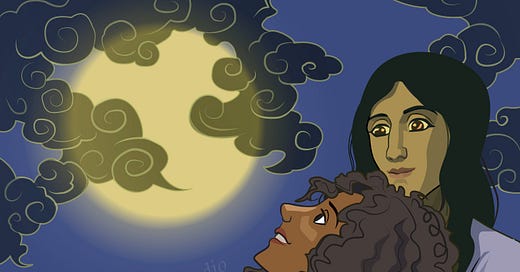Jewish and Muslim writers of homoerotic poetry from North Africa and Muslim Spain
Poetry about same-sex love from South Asia, West Asia, North Africa, and Al-Andalus (Part 2)
Hamda bint Ziyad al-Muaddib (Hamda daughter of Ziyad the Teacher), 12th century Spain
A famous Arabic poetess born in Guadix, Hamda bint Ziyad left us the following lines, translated by Dr Nabil Matar, an academic from Lebanon who now teaches at University of Minnesota:[1]
Tears have betrayed my secrets in a wadi [valley] whose beauty is striking;
A river surrounds every meadow; and every meadow borders every wadi;
Among the gazelle, a black fawn stole my mind, after stealing my heart;
She desires to lie down for a reason, and that reason prevents my sleep;
When she loosens her tufts, I see the full moon in the black clouds,
As if the dawn had lost a brother, and in sorrow, clothed itself in mourning.
There is another translation by a deceased British individual who erased both the blackness and the femininity of the love interest in this poem, using “they” instead of “she”. By the way, Hebrew and Arabic pronouns are binary gendered in both singular and plural forms. The gender of the love interest is NOT open to interpretation by the translator.[2] Concerns have been raised about errors in other translated works by that same European colonial translator.[3]
Ibrāhīm al-Miʿmār, 13th -14th century Egypt
Cairo-born architect Ibrāhīm al-Miʿmār was the most important Arabic poet of the 14th century.[4] He wrote these lines about his desire for bearded men:
I go crazy for men with full beards;
yeah, even those who can grip theirs with their hands![5]
Yishaq ben Mar-Saul, 11th Century Spain
Yishak ben Mar-Saul (Isaac, son of Lord Saul), aka Isaac ben Levi ben Saul, was a Hebrew grammarian and liturgical poet from Lucena.[6] He was also known for homoerotic poetry:
Like Joseph in his form
like Adoniah his hair
Lovely of eyes like David,
he has slain me like Uriah
He has enflamed my passions
and consumed my heart with fire.[7]
Ibn ‘Abd Rabbih, 9th-10th century Spain
Ahmad Ibn Muhammad ibn ‘Abd Rabbih (Ahmad, son of Muhammad son of Abd Rabbih) was a renowned scholar who served both Prince Abdullah of Cordoba and his successor.[8] Regarded as “the leading poet throughout the Maghrib”, Ibn ‘Abd Rabbih wrote these lines of Arabic poetry about his infatuation with a bearded youth.[9]
Oh you on whose cheeks the sprouting beard
has drawn two lines arousing passion and frustration,
I never knew your glance could be a sword until you put
on the sword belt of your new beard
And many more illustrious poets
Homoerotic works were not uncommon among the Arabic poets of Andulasia.[10] The same could be said of poets writing in Hebrew.[11] "Deal gently with the young man": Love of Boys in Medieval Hebrew Poetry of Spain | Speculum: Vol 57, No 1 from University of Chicago presents translations of Hebrew homoerotic poetry of Yishaq ben Mar-Saul of the 11th century and Isaac Ibn Abraham of the 12th century, amongst others.
For those who are wondering why men are over-represented in the list of homoerotic poets, Male-Male Love in Classical Arabic Poetry from Cambridge University Press offers the following explanation:
“Love between women did leave its trace in literature. Indeed, one of the legendary Arabic couples of myth … was a female-female pair … Nevertheless female-female love hardly plays a role in love poetry and the reason for that is simple: while women did compose poetry, they were not supposed to publish it…”
Part 3: Arabic, Kurdish, Persian and Turkish homoerotic poetry from 8th-19th century West Asia
[1] In the Lands of the Christians: Arabic Travel Writing in the Seventeenth Century, ed. by Nabil Matar (Abingdon: Routledge, 2003), p. 127.
[2] Subject, Object and Possessive Pronouns in Arabic | OptiLingo
[3] Hafiz Abdul Qayyum Manzar Kanju, Lexical Errors in the Qur'anic English Translation by Arthur John Arberry http://pu.edu.pk/images/journal/szic/PDF/1-Engv32_47_17.pdf
[4] al-Miʿmār, Ibrāhīm — Brill (brillonline.com)
[5] Male-Male Love in Classical Arabic Poetry (Chapter 6) - The Cambridge History of Gay and Lesbian Literature
[6] ISAAC BEN LEVI BEN SAUL OF LUCENA - JewishEncyclopedia.com
[7] Internet History Sourcebooks Project – Homoerotic texts (fordham.edu)
[8] Scholar of renown: Ahmad ibn Muhammad ibn Abd Rabbih | Arab News
[9] Al Andalus. Homoerotic Poetry. An Unexpected Discovery. (spainthenandnow.com)
[10] Hispano-Arabic homoerotic poetry - Wikipedia
[11] Medieval Hebrew poets 'come out of closet' in new anthology - Life & Culture - Haaretz.com




